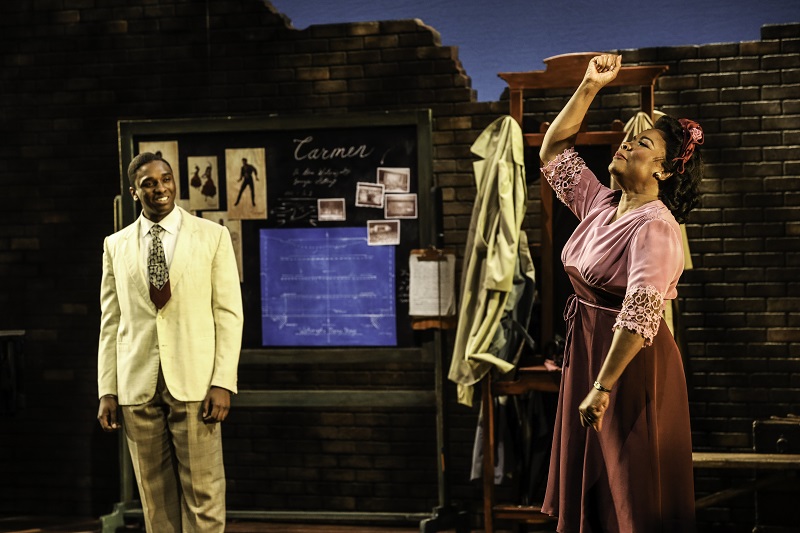New Carlos Simon work brings attention to neglected opera impresario

Jonathan Pierce Rhodes and Denyce Graves in The Passion of Mary Cardwell Dawson at the Kennedy Center. Photo: Jati Lindsay
Although Washington National Opera will not return to the Kennedy Center Concert Opera House until May, the company is making use of the complex’s other theaters in the meantime, including a presentation of The Passion of Mary Cardwell Dawson in the Terrace Theater, heard at the 2 p.m. performance on Sunday afternoon.
Billed as a “play with music” and featuring text and lyrics by Sandra Seaton and original music by Carlos Simon, the work, previously seen at the Glimmerglass festival, highlights the extraordinary story of Dawson and her National Negro Opera Company. Founded in 1941 in Pittsburgh and subsequently relocated to the nation’s capital, the company presented black artists in productions in cities across the U.S. at a time when major companies were still segregated. One need only follow the timeline of great black singers of the 20th century in the related lobby exhibit to see the contrast between the household names of the post-1950s period and earlier artists whose legacies are only dimly remembered, a stark reminder of the terrible artistic and human cost of segregation in the opera world.
The play follows an episode in 1943 in which the company prepares to mount a production of Carmen on the floating performance barge that sat in the Potomac River opposite the Lincoln Memorial during the period (and also featured mid-century National Symphony Orchestra concerts). When rain threatens the production, Dawson is offered a hall with segregated seating but refuses, over the initial protestations of three young cast members eager for a chance to perform above all else.
Seaton and Simon previously collaborated on a short work entitled Night Trip, which was one of the standouts of the 2020 iteration of the American Opera Initiative, WNO’s annual evening of new 20-minute operas. In this new work, the original music is limited to three ariosos for the Dawson character and some incidental piano music. Yet these interludes represent some of the work’s most compelling stretches, from an initial rueful meditation on how Dawson has divided up her life and passions to navigate a hostile world, to a statement of defiance against the hall owners who would force her to segregate her audience, and finally in a benediction to art and performance. Simon’s music brings layers of ambivalence and insight to these lyrical character portraits, set against Seaton’s evocative texts.
A champion of Dawson’s story, Denyce Graves assumed the titular role and delivered gripping interpretations of these sections. Simon’s appealing vocal writing offered many opportunities for Graves to delve into her rich lower register; and while the top is more constrained, she was able to fill the Terrace Theater with only occasional evidence of more effortful vibrato. Graves’ tender handling of the closing section was especially exquisite. Music director Marvin Mills provided fine accompaniment from the onstage piano.
Unfortunately, the surrounding play could not always sustain the level of interest achieved in the new musical material. Seaton’s script effectively lays out the central conflict but seldom finds its way beyond the realm of pleasing and informative action into richer, character-driven drama. More nuanced elements of Dawson’s personality, plumbed in the original songs, do not fully translate into the spoken dialogue scenes, where Graves’ performance often felt weighed down by exposition. Director Kimille Howard kept the material moving, though some different choices might have prevented recurring interactions from becoming overly repetitive.
As noted in the program, The Passion of Mary Cardwell Dawson is still evolving, and more attention to the three young singers and their stories (and hopefully some additional dedicated music) might help to deepen future iterations. WNO Cafritz Young Artists Amber Monroe and Jonathan Pierce Rhodes, as the singers rehearsing Micaëla and Don José, and Taylor-Alexis DuPont, as the evening’s prospective Carmen, were primarily utilized for a series of beautifully sung extended Carmen excerpts, though all handled the straight scenes winningly when given the opportunity. Only Rhodes’ character received a bit more to play (in a poignantly delivered monologue), leaving us wanting stronger arcs for these characters beyond the tidy resolution of coming around to Dawson’s position on rejecting the segregated hall.
Washington National Opera presents Blue, a recent opera by Tazewell Thompson, in the Kennedy Center Eisenhower Theater March 11 to 25. kennedy-center.org
